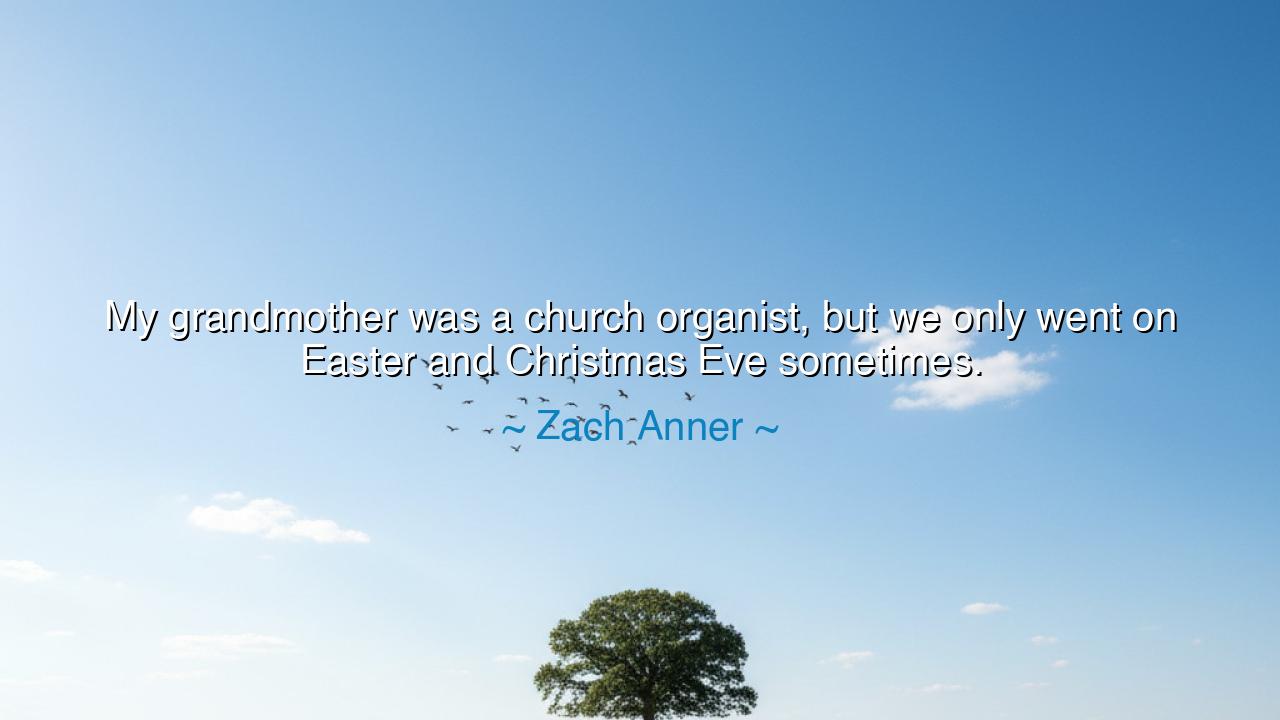
My grandmother was a church organist, but we only went on Easter
My grandmother was a church organist, but we only went on Easter and Christmas Eve sometimes.






Host: The soft hum of the evening settled into the room, creating a quiet space for reflection. Jack sat at the table, his fingers resting lightly on his cup, considering the simplicity of Zach Anner’s words. Jeeny stood near the window, her gaze turned inward, lost in thought as she processed the meaning behind his statement.
Jeeny: “I’ve been thinking about what Zach Anner said: ‘My grandmother was a church organist, but we only went on Easter and Christmas Eve sometimes.’ It’s such an interesting way to describe his relationship with religion, isn’t it? The idea that his grandmother was deeply involved in her faith, yet his family’s engagement with it was more sporadic, tied to those special occasions.”
Jack: “Yes, it really is. It shows how, even when a family has a strong connection to something, like religion or tradition, it doesn’t necessarily mean they engage with it regularly. Anner is pointing out that while his grandmother was dedicated to her role as an organist, the family’s participation was reserved for those big moments—Easter, Christmas Eve—when religion feels more like a celebration than a routine. It’s a reminder that rituals, even ones as significant as church, can sometimes be more about occasion than daily practice.”
Jeeny: “Exactly. I think it’s a reflection of how we often associate tradition with certain milestones or holidays. There’s something almost nostalgic about going to church on those special days, isn’t there? It’s not about the regular, everyday practice—it’s about marking those important moments. Anner’s story makes me think about how we sometimes engage with traditions based on cultural expectations or personal significance, rather than out of consistent practice.”
Host: The quiet in the room deepened as they both considered how traditions and rituals often become tied to the milestones in our lives—the moments that feel bigger or more meaningful. Jack’s fingers rested on the table, and Jeeny’s gaze softened, reflecting on how often holidays and special occasions take on a more symbolic meaning in people’s lives.
Jack: “It’s interesting because it shows that spirituality or faith doesn’t always have to be about regular attendance or following rituals strictly. For Anner, and perhaps many others, those times of the year—Easter, Christmas Eve—become the moments to connect with something larger, even if they’re not engaging with it day-to-day. It’s almost like the meaningfulness comes from the connection to the occasion itself, not the frequency.”
Jeeny: “Yes, and I think that’s what makes Anner’s story so relatable. It’s a reminder that faith or rituals can hold significance in different ways for different people. It doesn’t have to be about doing it all the time—it’s about how those moments resonate with us, how we choose to engage with them. For some, those occasions become more about tradition and family, not necessarily about consistent practice.”
Jack: “Exactly. And I think Anner is showing us that sometimes the rituals themselves can take on a different meaning when they’re not about routine but about special times that bring people together. It’s less about a prescribed way of doing things and more about the personal connection to what those moments represent.”
Jeeny: “Yes, and there’s something beautiful in that, isn’t there? The way tradition can be a living, breathing thing, adapting to people’s needs, and shifting to fit how we personally connect to it. Whether it’s religion, family traditions, or any kind of ritual, the way we practice them is shaped by our own experiences and meanings, not just by the way they’re supposed to be done.”
Host: The stillness in the room felt deeper now, the recognition that faith, tradition, and rituals take on personal significance that often transcends prescribed practices. Zach Anner’s words had sparked a reflection on how we engage with tradition—not just out of routine, but out of personal connection and the value we find in certain moments. Jack leaned back slightly in his chair, while Jeeny’s gaze softened, both of them recognizing the unique and evolving nature of ritual and tradition in their own lives.
Jack: “So, what Anner is showing us is that tradition isn’t just about strict practices—it’s about personal meaning and connection. We don’t have to engage with it every day for it to be valuable. Sometimes the most meaningful moments come from the times we choose to engage, the ones that feel special or important to us.”
Jeeny: “Exactly. It’s about finding what resonates with us, when it resonates with us. Anner is reminding us that traditions don’t have to be rigid—they can be something we personalize, something we connect to in our own way. Whether it’s church, family gatherings, or anything else, those moments don’t need to happen all the time—they just need to matter when they do.”
Host: The evening had fully settled in, the quiet understanding between them a reminder that tradition and ritual don’t need to be rigid or routine to be meaningful. Zach Anner’s words had illuminated the personal and evolving nature of rituals, showing that the significance of our engagement with traditions lies in the meaning we attach to them, not in the frequency of participation. The world outside had darkened, but inside, there was light—a recognition that moments of connection, no matter how rare, can hold lasting meaning.






AAdministratorAdministrator
Welcome, honored guests. Please leave a comment, we will respond soon